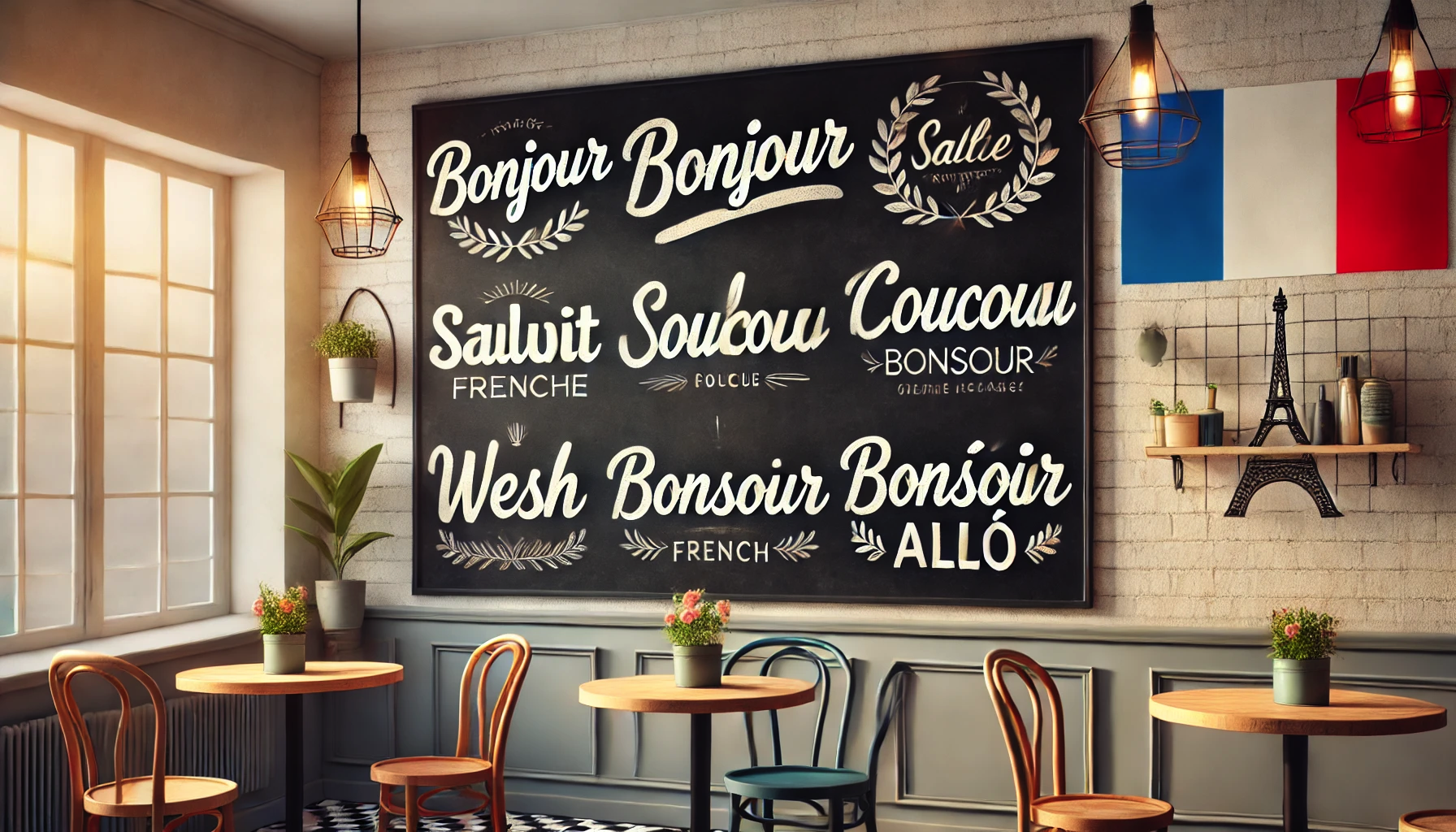You probably know “Bonjour” means hello in French. But that’s just the start.
These are all common ways locals say hello in French depending on the situation — formal, informal, or even playful.
- Bonjour – standard and polite
- Salut – casual, for friends
- Coucou – playful, used in texts
- Wesh – slang, heard among teens
- Bonsoir – for evenings
- Allô – used only on the phone
- Je vous salue – Very formal. You might hear it in public speeches or formal writing.
- Hé – Casual “hey.” Short and informal.
- Quoi de neuf ? – Means “what’s new?
Whether you’re visiting France or just learning the language, knowing how to say hello in French helps you feel more natural in everyday situations.
Table of Contents
10 Ways to Say Hello in French (And When to Use Them)
1. Bonjour
Use this in the morning or afternoon with anyone.
Example: Saying hello to a cashier or colleague.
2. Bonsoir
Say this in the evening, starting around 6PM.
Example: Greeting someone at a dinner party.
3. Salut
Casual and friendly. Use it with people you know.
Example: Meeting a friend or texting someone.
4. Coucou
Playful. Mostly used in messages or with kids.
Example: Texting your best friend or saying hi to a child.
5. Allô
Only for phone calls. Never use it face-to-face.
Example: Picking up the phone: “Allô ?”
6. Wesh
Slang. Used by teens and in street language.
Example: “Wesh, ça va ?” (Hey, how are you?)
7. Ça va ?
Literally means “how’s it going?”, often used alone as hello.
Example: Walking into a room: “Ça va ?”
8. Hé
Casual “hey.” Short and informal.
Example: Trying to get someone’s attention: “Hé, Paul !”
9. Quoi de neuf ?
Means “what’s new?” — casual greeting between friends.
Example: Seeing an old classmate.
10. Bien le bonjour
Old fashioned or humorous. Not common, but understood.
Example: Used in writing or to sound playful.
Formal Greetings (For Work, Strangers, or Older People)
Use these when you’re speaking to someone older, someone you don’t know, or in professional settings.
| Greeting | When to Use It | Example |
|---|---|---|
| Je vous salue | Very formal. Found in speeches or formal writing. | Used in a public ceremony or traditional event. |
| Bonjour | Use during the day in formal or public settings. | You walk into a bakery. You say “Bonjour.” |
| Bonsoir | Say this in the evening or at night. | You enter a restaurant for dinner. You say “Bonsoir.” |
| Comment allez-vous ? | Respectful way to ask “how are you?” | You greet a client or elder. You say “Comment allez-vous ?” |
Casual and Friendly Greetings in French
Use these when you’re with people you know. They’re relaxed and common in daily life.
| Greeting | When to Use It | Example |
|---|---|---|
| Salut | Use with friends, classmates, or coworkers you know. | You walk into a friend’s house. You say “Salut.” |
| Coucou | Playful. Often used in texts or with close friends. | You send a message to a friend. You write “Coucou.” |
| Ça va ? | Casual “how’s it going?” Often used as hello. | You meet someone at a café. You say “Ça va ?” |
| Hé | Simple “hey.” Used to get attention. | You see a friend across the street. You say “Hé !” |
Slang and Modern Ways to Say Hello in French
These are used in casual settings, often by teens or young adults.
| Greeting | When to Use It | Example |
|---|---|---|
| Wesh | Used like “yo” or “what’s up.” Common in youth slang. | You greet a friend in the street. You say “Wesh.” |
| Yo | Borrowed from English. Very casual. | You start a group chat. You type “Yo.” |
| Quoi de neuf ? | Means “what’s new?” Friendly and relaxed. | You meet a friend after time apart. You say “Quoi de neuf ?” |
| Re | Short for “rebonjour” or “re-salut.” Means “back again.” | You return to a group chat. You say “Re.” |
📌 Tip: Want to practice how to say hello in French with locals? Join one of our language courses in France.
When to Use Each Greeting
Different greetings work in different situations. Use this as a quick guide.
By Time of Day
- Bonjour – Use in the morning or afternoon
- Bonsoir – Use in the evening
By Relationship
- Formal (strangers, older people, work): Bonjour, Bonsoir, Comment allez-vous
- Friendly (friends, family): Salut, Coucou, Ça va ?
- Very casual (close friends, texts): Wesh, Yo, Re
By Setting
- In person: Bonjour, Salut, Ça va ?
- On the phone: Allô
- In a message: Coucou, Yo, Re
✔ You meet a neighbor in the hallway in the morning — say “Bonjour”
✔ You message your best friend — say “Coucou”
✔ You pick up the phone — say “Allô”
Mistakes to Avoid When Greeting in French
| Mistake | What to Avoid | What to Do |
|---|---|---|
| Using casual greetings in formal settings | ❌ You greet your professor with “Salut” | ✅ Say “Bonjour” instead |
| Skipping a greeting | ❌ You walk into a store and say nothing | ✅ Always say “Bonjour” when entering |
| Using “Allô” in person | ❌ You say “Allô” face-to-face | ✅ Use “Allô” only on the phone |
| Wrong time greeting | ❌ You say “Bonjour” at night | ✅ Say “Bonsoir” in the evening |
| Mispronouncing greetings | ❌ You say “Bon-jor” | ✅ Say “Bon-zhur” |
Keep Learning: Say More Than Just Hello
Now that you’ve learned how to greet someone, take the next step.
- 👋 Want to learn how to say goodbye the right way? How to say goodbye in French
- 📘 Just getting started with the language? Essential French learning tips for beginners
These guides help you speak more naturally, avoid mistakes, and build confidence.
You don’t need to memorize lists. You just need to know what to say, when to say it, and who to say it to that’s what these cover.







